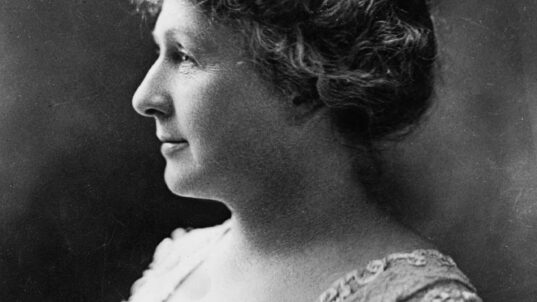A discussion summary for the third and final session of an online exploratory discussion series on Technology & Democracy

Hera Hussain via webfoundation.org
In this third and final session of our small group conversation series on the topic of Technology & Democracy, citizens from around the country again gathered online via Zoom for an exploratory discussion to develop different ideas about how technology might support and actually strengthen our democracy. The two prior sessions in this series focused primarily on different negative impacts of technology on democracy (e.g., spreading disinformation, eroding trust, and undermining privacy with surveillance). By contrast, this final session had a more hopeful overall focus as the participants developed different possibilities and policies for governing our technology in ways that might enhance democracy.
The inspiration and starting point for this final discussion in the series was a blog post, Just Imagine … Technology and Positive Social Change, by Dr. Jack Byrd. In short, this post described the award-winning efforts of Hera Hussain, a young tech social entrepreneur who worked with a network of global volunteers to form Chayn, an organization to provide support to women in vulnerable situations. Working with survivors of gender-based violence, Chayn created a web-based library of self-help guides and other resources for women. These resources are written in simple, easy-to-understand text and are available in multiple languages. From this inspiring story, the participants in this discussion worked to develop other ideas about how technology might support a healthier, self-governing society.
In the Discussion Summary below we have summarized some of the common themes from this discussion as well as the different policy possibilities suggested and explored by participants in this final session of the Technology & Democracy series. As always, we wish to thank all the participants for their generous and enthusiastic participation, for their many different and innovative ideas, and for their willingness to share and develop them with others.
Discussion Summary for Session #3 of the Technology & Democracy Series
If you had one wish that could make it so our technology would be used to enhance our democracy or improve our ability to be a healthy, self-governing society, what would it be? Why?
- That larger online vendors (Amazon) and other data collectors would share their data—
- with local businesses to revitalize local merchants and to avoid the environmental issues of shipping, cutting down on all those cardboard boxes.
- To providing needed human services (water, housing, education) rather than solely for commerce.
- Because the environment and basic human services are vital elements of any society.
- That our technology and especially high-quality, broadband internet service would be equally available in all areas—it will help us to have a better-informed population, which is essential for democracy. Because equality and especially equality of access to information is the essential circulatory system of democracy.
- That we’d have transparency and control over the collection and use of our data:
- Would know who has what, and have a choice about its collection and use.
- We should all own our data.
- Return control to the person who generates the info rather than the collector; change default to presumption that each individual controls their own info.
- Because democracy depends on individuals (not corporations) being in control of themselves and their information.
- That we would break up tech monopolies so there are more options, more competition, which would open up more opportunities for people to share their thoughts and opinions, less risk of censorship.
- That we’d get proper information about who has what roles in managing the impacts of technology on our democracy. Is it the government, the private sector?
- What are our rights as citizens? What does freedom of speech even mean?
- We need clarity on these rights and on who should legitimately control them.
- Wish for an artificial intelligence (AI) that is truly unbiased and works like a personal mentor or coach, helping me see where I’m being biased or narrow-minded.
- Could work to expand perspectives that we may be missing and help us in discussing complex issues
- Could help maximize the “wisdom of crowds.”
-

Image by Peggy und Marco Lachmann-Anke from Pixabay
That we’d have a Star Trek-like “transporter” button on our computers so that we could physically transport to meet and converse with people in person rather than just “online.” We need in-person connections, we need to see all the body language and to connect more directly than thru a screen. Without the more direct, in-person connections and relationships our democracy, our society suffers. Without in-person contact, we’re not able to know people as deeply and learn from them and their different views and life experiences. Online meetings certainly help and are better than nothing, but a “transporter” button would be better.
- That our technology could help us better connect with our political leadership: connect their statements with their actions; hold them more accountable; hold them to task and to real issues, not side stories.
- That our technology could better include the voices of all citizens; more real people. That our technology could close the gaps between perceptions and reality, and help us to see and understand more regular people and the issues they face. Make it “more real”—without understanding ourselves and our world, democracy cannot thrive.
- That there were alternatives to the singular, monopolistic social media platforms (Facebook, Twitter, etc.). Platforms that would open up opportunities to meet different people from ourselves and also avoid (or place less emphasis) on algorithms that seem driven to both stoke outrage but also to silo us. Platforms that would pique our interest in the new and different. We all need to be able to “connect” and to connect better in order to strengthen our democracy.
- That we’d focus first on implementing and restoring the fundamental building blocks of our political systems, especially in our ability to trust each other, in our governments’ ability to command the trust of all citizens and not just a singular party or sect; and in our ability to run bureaucracies that our free of corruption. Without these primary, non-tech building blocks, our democracies cannot thrive.
- That we had an improved and online voting and elections system! That our technology provided for an easy and robust way to vote (and otherwise participate) online; that we could with just a few keystrokes: vote; and have access to nonbiased voting information and information about the candidates, the parties, their positions, their votes, etc. That the technology would not only allow us to vote easily but to also facilitate “meaningful participation” by all. That we could easily become much more informed on any issue, provide feedback, and know what we’re voting on. Technology could help develop “high information” votes and voters to strengthen our democracy rather than exacerbating low-information or even disinformation.
What different goals, purposes, or values come into play with managing technology and its impact on a democratic society? What other purposes and which people does technology benefit, might it benefit?
- Goal of reducing inequality in our society—e.g. by making sure there is equitable access to high-speed internet, which is needed for learning and education, which are important for a self-governing society.
- HS students shouldn’t have to go to McDonald’s for Wi-Fi in rural communities.
- The better educated people are, the better they know themselves, and less likely to be manipulated.
- We need to change or challenge the assumption that everyone needs to be plugged in (both in the sense of being plugged in to electricity and/or to the internet) all the time.
- The goal shouldn’t be to always be on, always connected.
- We should be ready to live offline as well.
- We should have redundancies built in, so that we can carry on our lives, function as a society, even if the internet, or electricity, goes down.
- A goal of connection—we benefit from the wisdom of crowds if we all are connected, which means at an international level as well (not just locally or in the nation)
- Who really does, or should, control technology—especially its impact on democracy or society.
- Is it the companies that develop/use technologies?
- The government?
- There’s a risk of too much government control, which hurts democracy
- Too late—the government already can get any information they want, it can confiscate your devices, pull down any website.
- Regulating data collection and use. A policy goal could be to sort out control over what entities can do with the data they collect. Transparency as a goal as well, collectors should have to say what info they want and why, what purposes they are going to use it for.
- We need to build, re-build public trust. As is, there’s little to no incentive, no motivation, or public purposes—other than profits built on commerce and stoking outrage—for us to be able, politically, to act, to “build out” our technology to better serve more people and to serve democratic ends. We no longer trust each other enough to fund a new and better “commons”.
- In rebuilding that trust, we need to have our politicians interact more with voters outside their base and their immediate district. What if, our technology could help them (or force them?) to interact with voters, with citizens in other areas and from other “tribes?” We need to “mix it up” more—technology could help with that.
- We need to focus on politics first. We already have the technology for online voting and much else; what we lack is the political will to improve/increase access for all voters. And one party, especially, has no interest in expanding online access or voter access. Trust and effective governance are again key and challenging (often absent) elements—regardless of the technology.
- Perhaps we could take advantage of technology’s ability to “leap frog” over barriers and change cycles: g. skip altogether building hard-scape infrastructure for telephone landlines and go straight to cell service and wireless technology as has happened or is happening in much of Africa. Avoid the high cost of building pipes or buying computers; go with more hand-held devices.
- What about increasing real competition? Moving to a more “open-source” framework to enhance the further innovation that we need.
- What if technology could be deployed in service of a “commons” (like transportation infrastructure, education, defense, etc.) that serves, nurtures, and sustains our democracy.
- What if our technology could be re-deployed to helping to meet people’s basic needs, perhaps our technology should first be re-directed toward providing some of those needs—like clean drinking water, jobs, education, public health, etc.…..
- What if our technology could have a common goal of bringing us together, rather than driving us apart. Democracy is about both sharing power and finding workable agreements or compromises, not finding ways to further divide us.
What different possibilities can we imagine for governing the design or deployment of technology to better serve democracy—to better maximize technology’s positive effects and minimize the negative ones?
- Regulate data collection: what companies can collect and what they can do with it.
- People will always get around regulations
- Regulation can be a double-edged sword: can help protect you from abuses, but can also block socially-useful innovations.
- Regulate to give individuals more control over their data.
- Companies should have to let us know what info they are collecting and why.
- Individuals should have the right to set limits, to deny them the use of some personal information.
- Foster trust via policies of transparency about what information is being collected and why—this would foster more trust in the uses of technology.
- Focus on values & ethics—the importance of distinguishing between professed values and our actual, lived values.
- We see people’s real values by seeing how people live, what they do—not what they say.
- Social values versus personal values—we have to think of how we get along as a society in the best way. For example, what is right in my own life, or in my family, may not be right out in public or for the whole society.
- We are a diverse society, with many different cultural backgrounds, which means different values.
- We need a consortium on values across these differences—we may not agree on the most important values, but we need to try to understand each other’s values.
- Learning that lots of freedoms come with lots of responsibilities—we have to learn these obligations as well.
- Personal and professional ethics matter too:
- What is ethical in one culture differs from another—have to sit down and discuss it.
- Vocational ethics codes; Engineering has a code of ethics; e.g. don’t take on projects beyond your competencies, etc. Ethics for software development?
- Crucial to rebuild trust….so that we can have the political capacity to do anything.
- Focus on simplicity for tech users, for individuals—shift the burden so the presumption isn’t that the individual has to figure out how every app works and have to take on the responsibility of learning everything…or buying every device?
- Technology is here to make our lives easier.
- Shift: adjust technology to people, not people to technology.
- Focus on making every vote count, equally (one person, one vote). Use tech to make democracy work in a fairer more trustworthy way.
- Focus policy on using technology to address and remediate inequalities in our society. Use technology to level out the playing field.
- Tech is great at distribution tasks—so focus this on basic needs that are falling short: food, housing, education.
- We’ve been using technology to increase inequalities, now we need to shift this by using it to distribute resources to repair inequalities.
- The post office makes sure everyone has access to some basic things—so use technology to serve similar goals.
- Develop and use artificial intelligence to help us become better, more moral citizens: Create an AI coach that is like a guardian angel, helping me learn and helping my moral development—the goal is to make us better, more ethical people.
- Could also monitor basic human needs and rights, like health (might monitor my health and help me make better health choices), helping us function better throughout our lives.
- AI moral mentor—there’s no perfect set of values, and values change over time. Keep me current and encourage me to keep learning and developing.
- Regulate high-tech like a public utility, as part of our “public” infrastructure”—like a basic communications system, or our utilities, or transportation systems.
- Leave it alone; do nothing different. Another possibility is to leave it alone and leave the development and deployment of technology (and the service or disservice it does to our democracy) to the judgment of the large, private companies that now dominate the marketplace—Google, Amazon, Facebook, Apple, Microsoft, Verizon, Comcast, etc.…
- Encourage competition and newer, disruptive technologies. spur competing start-up technologies and look for new “disrupting” technologies.
- Rely on the largess of the moguls to move forward on their own to develop and deploy technology that serves democracy. Kind of the “Carnegie Library” model updated to democracy and technology, to voting, to informing voters… etc.
- Build an entirely new platform for voting, information, etc. Perhaps new devices—“democracy devices” that can be distributed to all that will allow access, enable voting, provide neutral information….
- Focus on Community and “design for Local” What if we focused on developing technology that would “focus on community” and on bringing us together in ways to help sustain our communities at a local level? All politics is local—our technology could be put back into service of that model.
- Alternatively, what if our technology helped us to find, connect, with and nurture non-local, newer, interest-based communities….?
- Create a new public “Tech Corp”—an updated “Peace Corp” analogue—geographic based, available both online and in person to all citizens and to help with access, learn the technology, and serve community and democracy.
- Focus technology on taking care of basic needs (beyond commerce and consumption). Use it to help deliver clean water, good schools, health care, affordable housing, and public transit for all citizens rather than gossip and salad spinners.
- Reconnect for Democracy. A new public bulletin board and an alternative to Facebook, Instagram, Tik Tok, Linkedin, etc. We also need to use our technology to “connect” with others more deeply, to learn, to appreciate our commonalities and our differences, and not just to make money for a few on the basis of appealing to our basest and most divisive proclivities—or our desire to be entertained by pet videos and online shopping.



